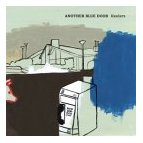Our young Mr. Dave Schoonderbeek (is that Dutch?) from Toronto has undergone a number of re-incarnations, artistically speaking. Starting with what he describes as 'angry rocker,' Schoonderbeek eventually found his sensitive side, shearing his locks into a mussy coif and plucking an acoustic guitar. However, after finding himself quickly labeled as a "folk musician," he wisely put the goddamn angry back into his rock.
Forming Another Blue Door, Schoonderbeek and company were intentionally drawn towards shoegazer atmospherics, but alas Shoonderbeek's past lives and relationships have crept their way into this project, forcing themselves through his manifold identities on this roller-coaster of a record. "Haulers" is carried around like a heavy weight upon the shoulders of Schoonderbeek, who nakedly reveals himself through stories of insecurity, depression and loneliness.
His true charm is in his lyrical ability to construct a clear reference to location and time. Hearing a fragile, broken voice singing the lines, "I'm all alone/and when I get back home/I think of Jesus under those blinking lights" takes me to a place where I can nearly feel the damp cold sinking into my bones, reminding me of the loneliness I've experienced during that time of year that we snidely preach of comfort and joy, cocoa and kisses.
Of course this sense of desperation and loneliness is only propagated by Schoonderbeek's very Robert Smith-esque wail. Ah yes, Mr. Smith is still the undisputed king of self-loathing misery, and Schoonderbeek makes me want to go back and pull out Seventeen Seconds or Disintegration with a cheap bottle of Burgundy. But more than a haven for bat-cavers and pity-partiers, Another Blue Door opens itself widely to influences as far reaching as Pavement, Neil Young and Bruce Springsteen, at times "rocking out" and at other times "folking out," quite often within the same song.
Schoonderbeek's modus operandi seems to be to start off gently — perfectly — but crescendo to a catostrophic, thundering end (much like the downtrodden relationships he cries about). As attractive as his eclecticism and eccentricity may seem (along with the mussy coif), it is the more balanced and stable side of Shoonderbeek that is the most compelling. On Haulers, songs like "Christmas '98" and "Muzzled" capture a more refined, more… "real" essence, so to speak. I can only wonder if this isn't the same point made by Schoonderbeek's numerous ex-lovers: stop hiding behind your self-imposed cataclysms, using your conjured drama as a means to separate yourself from that which you fear losing. Stop opening doors only to hear the sound of slamming them fiercely shut.
